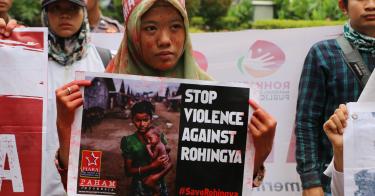In a welcome move, the U.S. Department of State issued sanctions against four senior Burmese military officials. One of those sanctioned is Senior-General Min Aung Hlaing, the man directly responsible for atrocities committed against the Rohingya, a Muslim minority group in Burma.
While State’s action stopped short of financially sanctioning military officials, it subjects them to a travel ban and represents a positive step toward accountability.
In August 2017, the Burmese military carried out so-called “clearing operations” in Rakhine state, a western region of Burma populated primarily by Rohingya. These operations displaced more than 750,000 Rohingya who fled to Bangladesh.
The military’s brutality was breathtaking. Conservative estimates suggest that more than 10,000 Rohingya were killed, countless more were raped and sexually abused. Members of the Burmese military were even seen snatching newborn babies from their mothers’ arms and throwing them into fire. All of these actions were instigated and orchestrated by Senior-General Min Aung Hlaing and carried out by his senior military cadres.
The events of August 2017, and the violence that preceded it, were of so massive a scale that a United Nations Fact-Finding Mission report determined that genocide, crimes against humanity, and war crimes took place. This finding was corroborated by the U.S. Holocaust Memorial Museum and echoed by other civil society organizations.
The U.S. government has yet to issue an official determination on crimes committed.
Still, credit should be given when credit is due. Washington’s newly applied sanctions represent the first steps taken by any foreign government to hold the Burmese military accountable. It comes in response to repeated calls by non-governmental organizations such as The Heritage Foundation, Amnesty International, and Human Rights Watch for the U.S. government to sanction senior Burmese military officials.
Far from being a final step, however, the travel ban should be the first of many sanctions to be levied against the Burmese military for the atrocities they committed against Rohingya. Indeed, the travel ban should be a warning shot that precedes the issuance of tougher financial measures.
The U.S. Treasury and U.S. Department of State technically already possess the authority to target Burmese military officials under the JADE Act or Global Magnitsky authorities. They can place these individuals on the Specially Designated Nationals list, allowing their assets to be frozen and/or seized.
Congress is also seriously considering legislation that would require the administration to impose financial sanctions on senior Burmese military officials. The passage of such legislation may increase the political will within the administration to take tougher actions against Burmese military officials.
Efforts to hold the Burmese military accountable for atrocities against the Rohingya should be messaged as a part of the values component of the Trump administration’s free and open Indo-Pacific strategy. While the security priorities outlined in the Indo-Pacific strategy are more evident, efforts to promote human rights and values remain less-developed.
The administration can change that perception by responding robustly to the Rohingya crisis.
Since August 2017, the U.S. has been the leading donor of humanitarian assistance to the displaced Rohingya. Now it is taking more substantial diplomatic steps to hold the Burmese military to account for its actions. Washington should go further, however, by issuing a determination on crimes committed against Rohingya and instituting targeted financial sanctions against the Burmese military.
This piece originally appeared in Forbes https://www.forbes.com/sites/oliviaenos/2019/07/19/new-sanctions-a-positive-step-in-responding-to-the-rohingya-crisis/#392bfac1bc37



